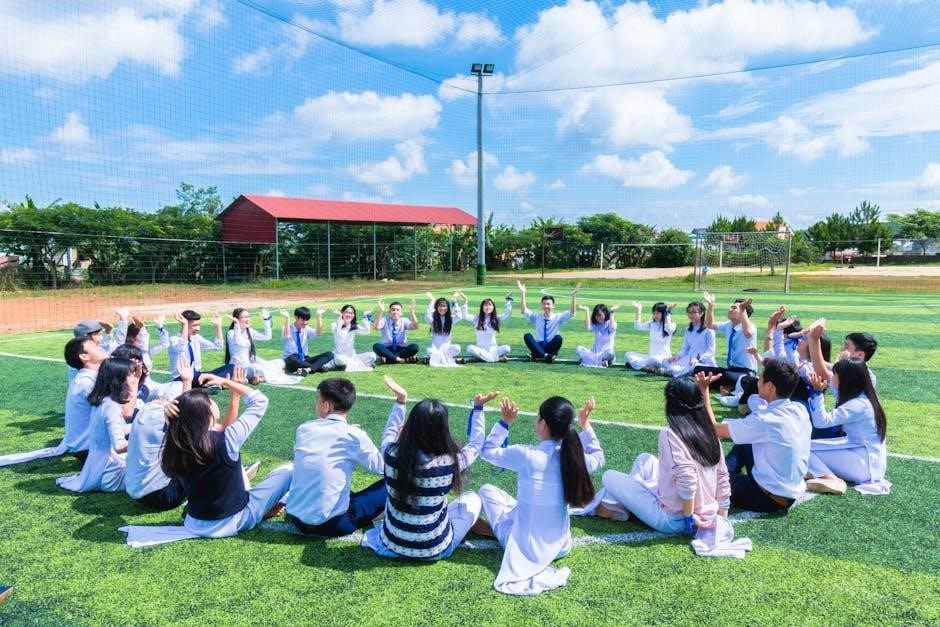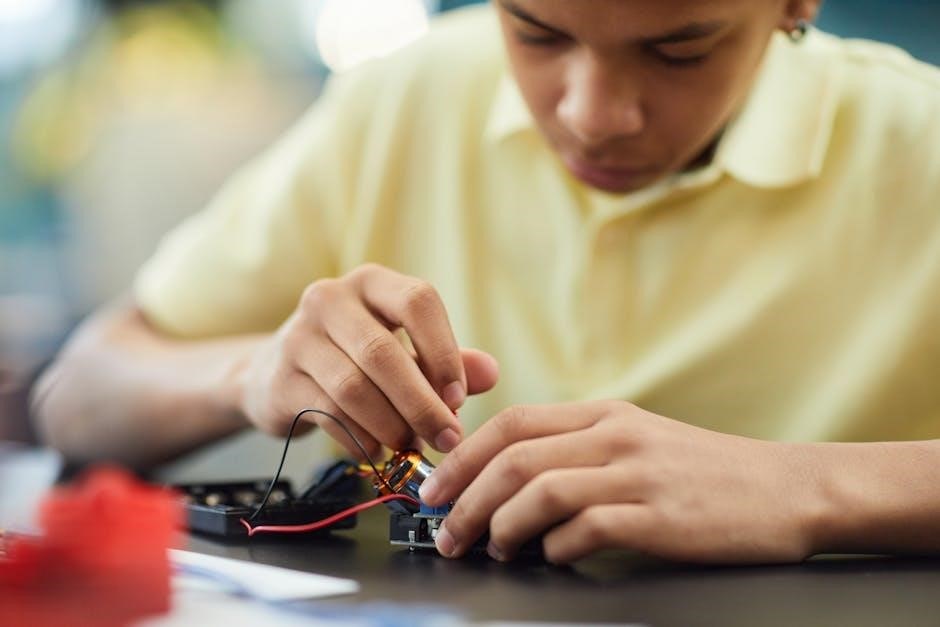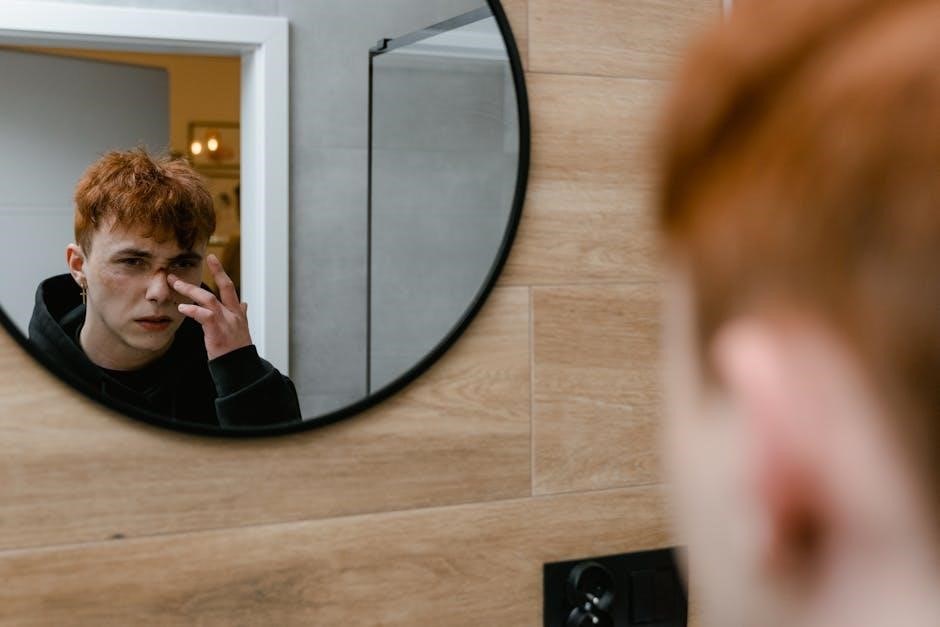Sean Covey’s The 7 Habits of Highly Effective Teens offers a self-help guide tailored for teenagers, addressing challenges like self-image, peer pressure, and goal-setting. First published in 1998, this book adapts Stephen Covey’s timeless principles for young audiences, providing practical advice for personal growth and success.
Overview of Sean Covey’s Approach
Sean Covey’s approach in The 7 Habits of Highly Effective Teens is centered on providing practical, actionable advice tailored to the unique challenges of adolescence. Unlike his father Stephen Covey’s original work, Sean’s version is specifically designed for teenagers, addressing issues like peer pressure, self-image, and family relationships. His approach emphasizes simplicity and relevance, making the seven habits easy to understand and apply. The book serves as a guide for teens to build self-confidence, improve relationships, and achieve their goals. It also offers resources like workbooks and audiobooks, ensuring accessibility for busy teenagers; Sean’s method is empowering, helping teens navigate life’s complexities with proven principles.
Habit 1: Be Proactive
Be Proactive encourages teens to take responsibility for their choices and actions, focusing on what they can control rather than blaming circumstances or others.

Understanding Personal Responsibility
Personal responsibility is the foundation of being proactive, empowering teens to take ownership of their choices and actions. It involves recognizing that true control lies within oneself, not in external circumstances. By embracing this mindset, teenagers can overcome excuses and blame-shifting, focusing instead on what they can influence. This habit encourages self-awareness, accountability, and integrity, helping teens understand that their decisions shape their lives. It’s about choosing responses wisely, even in challenging situations, and committing to personal growth. Mastering personal responsibility fosters resilience, self-confidence, and a proactive approach to life, setting the stage for effectively practicing the other six habits.

Habit 2: Begin with the End in Mind
This habit encourages teens to set long-term goals and create a personal vision, helping them prioritize decisions that align with their future aspirations and values.
Setting Long-Term Goals
Setting long-term goals helps teenagers create a clear vision for their future, guiding their decisions and actions. By identifying what they want to achieve, teens can focus on priorities that align with their values and aspirations. This habit encourages them to think critically about their potential and develop a roadmap for success. Whether academic, personal, or career-related, having long-term goals fosters accountability and direction. It also teaches teens to balance short-term desires with future benefits, helping them avoid distractions and stay committed to what truly matters. This mindset builds discipline and self-confidence, empowering them to take charge of their lives and work toward meaningful accomplishments.

Habit 3: Put First Things First
Habit 3 emphasizes effective time management by prioritizing tasks, focusing on what’s truly important, and minimizing distractions to align actions with personal goals and values.
Time Management and Prioritization
Effective time management and prioritization are crucial for balancing school, relationships, and personal growth. By focusing on what truly matters, teens can avoid procrastination and reduce stress. Learning to prioritize tasks helps in achieving short-term and long-term goals efficiently. This habit encourages teens to use tools like planners or digital calendars to stay organized. By distinguishing between urgent and important activities, they can allocate time wisely, ensuring productivity without burnout. This skill not only enhances academic performance but also fosters a sense of control and confidence, enabling teens to manage their lives more effectively and make the most of their time.

Habit 4: Think Win-Win
This habit encourages teenagers to seek mutual benefits in relationships, fostering cooperation and respect. By focusing on solutions where everyone gains, teens build stronger, more positive connections with others.
Building Positive Relationships

Building positive relationships is at the heart of Habit 4: Think Win-Win. This habit encourages teenagers to focus on mutually beneficial solutions, fostering trust, respect, and cooperation. By valuing others’ needs and perspectives, teens can create strong, supportive connections. Win-win thinking helps teenagers avoid manipulation or compromise, instead promoting open communication and empathy. This approach not only strengthens friendships but also equips teens to handle conflicts constructively. By prioritizing shared success, they cultivate a sense of unity and teamwork, which is essential for personal growth and lasting relationships. This mindset helps teens feel valued and secure, laying the groundwork for strong, enduring connections.

Habit 5: Seek First to Understand, Then to Be Understood

Habit 5 focuses on effective communication by listening actively and empathizing with others before expressing oneself. This fosters deeper connections and resolves conflicts constructively.
Effective Communication Skills
Effective communication is the backbone of strong relationships, and Habit 5 emphasizes the importance of truly understanding others before seeking to be understood. This involves active listening, empathy, and asking open-ended questions to gain insight into others’ perspectives. By doing so, teens can build trust, resolve conflicts, and foster mutual respect. This habit encourages teens to move beyond surface-level conversations and engage in meaningful dialogue, which is essential for personal growth and healthy relationships. Mastering this skill helps teens navigate social challenges, improve their emotional intelligence, and communicate more effectively in all aspects of life. It’s about connection, not just conversation.
Habit 6: Synergize
Synergy means working together to achieve something greater than what could be accomplished alone. By valuing diverse perspectives and collaborating, teens can create innovative solutions and build stronger relationships.
Collaboration and Teamwork
Collaboration and teamwork are essential for achieving synergy, as highlighted in Sean Covey’s The 7 Habits of Highly Effective Teens. By working together, teenagers can pool their unique skills and ideas, leading to outcomes that surpass individual efforts. Effective teamwork fosters mutual respect, open communication, and a shared sense of purpose. Teens learn to value diverse perspectives, resolve conflicts constructively, and take collective responsibility for success. This habit encourages teens to move beyond competition and instead focus on how their contributions can benefit the group. Through collaboration, they build stronger relationships and gain a deeper understanding of others’ strengths and weaknesses.
Habit 7: Sharpen the Saw focuses on self-care and personal growth. It emphasizes balance, mental and physical health, and strong relationships. Regular renewal enhances effectiveness.
Self-Care and Personal Growth

Habit 7: Sharpen the Saw focuses on self-care and personal growth, emphasizing the importance of balance in life. It encourages teenagers to nurture their physical, social/emotional, mental, and spiritual well-being. By prioritizing activities that promote renewal, such as exercise, reflection, and meaningful relationships, teens can build resilience and maintain high energy levels. Regular self-care helps prevent burnout and enhances overall effectiveness in other areas of life. This habit teaches teens to value themselves and invest time in activities that recharge their minds, bodies, and spirits, leading to sustainable personal growth and a fulfilling life.
Implementation and Practice
Teens can start by creating a daily routine that includes setting priorities, reflecting on experiences, and tracking progress. Using tools like planners or workbooks helps maintain consistency and focus, ensuring habits become a lasting part of their lifestyle.

Practical Steps for Teens
Teens can start by creating a daily routine that incorporates the 7 habits, such as dedicating time for goal-setting and reflection. Using tools like planners or journals helps track progress and stay organized. Prioritizing tasks based on importance and deadlines ensures effective time management. Teens should also practice active listening in conversations and seek opportunities to collaborate with others. Regular self-care, such as exercise and mindfulness, is essential for maintaining energy and focus. By consistently applying these habits, teens can build confidence, improve relationships, and achieve their goals. Consistency and patience are key to making these habits a lasting part of their lifestyle.
